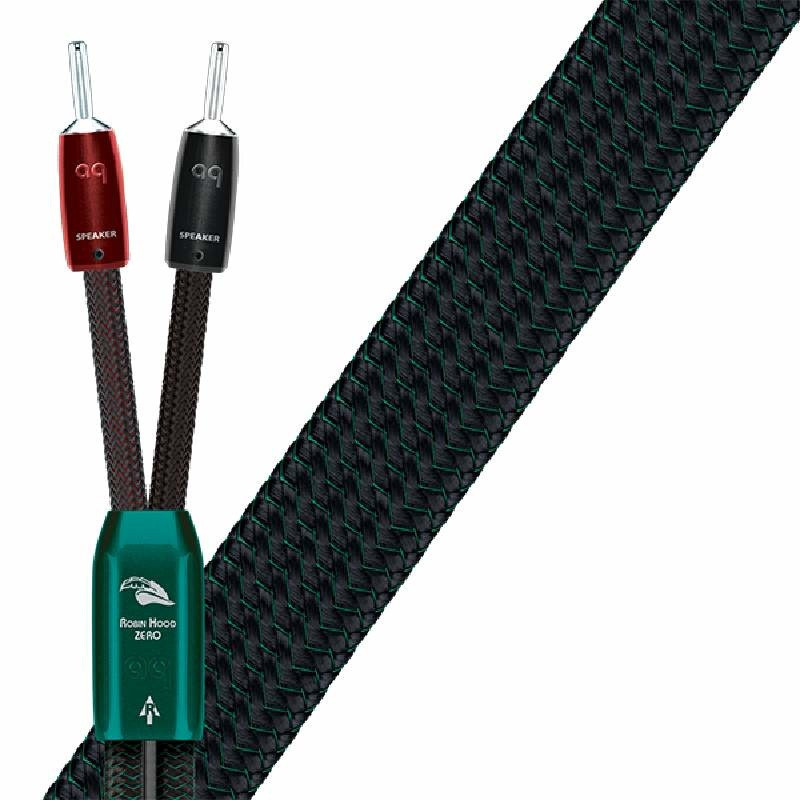



Cavi per Diffusori Terminati - Rame PSC+ - Zero Impedenza caratteristica
Assistenza italiana
Consulenza e preventivi
Spedizione monitorata
Basandosi su solide basi di tecnologie AudioQuest provate e vere, il team di progettazione di Garth Powell e Bill Low si è concentrato in particolare su uno dei problemi più fastidiosi che affligge il design del cavo dell'altoparlante: la mancata corrispondenza tra l'impedenza di origine dell'amplificatore e l'impedenza di carico dell'altoparlante. Eliminando l'impedenza caratteristica del cavo dell'altoparlante (tecnologia ZERO), la compressione corrente e la distorsione del transitorio segnale / corrente sono significativamente ridotte.
Il risultato è il contrasto dinamico, la risposta ai transienti e lo slam dei bassi che sono resi apparentemente senza sforzo, perché il cavo non ostacola elettricamente la musica.
Come i cavi a scartamento più grande della serie Mythical Creatures, William Tell e Robin Hood possono essere utilizzati in due modi: utilizzando il modello ZERO per Full-Range o utilizzando il modello ZERO in combinazione con un cavo BASS dedicato, come un cavo BiWire Combination completamente ottimizzato. Come i loro fratelli più grandi, anche William Tell e Robin Hood presentano la nostra tecnologia di reiezione del rumore in modalità comune brevettata. Insieme a Mythical Creatures, questi ultimi cavi per diffusori AudioQuest superano significativamente le precedenti tecnologie nel controllo e drenaggio del rumore in radiofrequenza.
CARATTERISTICHE
Silver ZERO nessuna impedenza caratteristica per il trasferimento corrente non compresso:L'integrità di qualsiasi transiente audio (oscillazione e corrente istantanea della tensione picco-picco) fornita da un amplificatore di potenza a un altoparlante è sempre stata compromessa. Sia che l'amplificatore sia una valvola o un transistor, indipendentemente dalla classe di funzionamento, l'impedenza della sorgente dell'amplificatore e l'impedenza di carico dell'altoparlante non sono mai eguagliate in modo critico. L'impedenza caratteristica del cavo dell'altoparlante è l'ennesima colpevole di un circuito elettrico non lineare altamente compromesso. AudioQuest ha sempre affermato che tutti i cavi causano danni perché l'output non è mai buono come l'input. Tuttavia, eliminando l'impedenza caratteristica del cavo di un diffusore, la tecnologia ZERO di AQ rappresenta un passo senza precedenti verso la riduzione di tale danno.
Il risultato è un maggiore contrasto dinamico, una migliore risposta ai transienti audio e uno slam dei bassi reso apparentemente senza sforzo perché il cavo non limita elettricamente (strangolando) la musica.
Conduttori in Argento Solido a superficie Perfetta (PSS) e in Rame Solido a superficie più che Perfetta (PSC+): I conduttori solidi impediscono l'interazione elettrica tra trefoli e cavi, principali fonti di distorsione. La qualità della superficie è fondamentale perché un conduttore può essere considerato come una guida per entrambi i campi all'interno di un conduttore e per i campi magnetici che si estendono all'esterno del conduttore. Il Perfect-Surface Copper + sorprendentemente liscio e puro elimina le asprezze e aumenta notevolmente la chiarezza rispetto a OFHC, OCC, 8N e altre monete premium. L'argento a superficie perfetta estremamente puro minimizza ulteriormente la distorsione causata dai bordi dei grani, che esistono all'interno di qualsiasi conduttore metallico.
Dissipazione del rumore del suolo (GND): Questa tecnologia brevettata di eliminazione del rumore estremamente efficace è distribuita sul percorso a terra in quasi tutti i cavi AQ AC Power, oltre ai cavi dei diffusori AQ Bass e Midrange.
Direzionalità: Tutti i fili o conduttori metallici trafilati hanno una struttura a grana non simmetrica, e quindi direzionale. AudioQuest controlla la variazione di impedenza RF risultante in modo che il rumore venga scaricato da dove causerà la distorsione. La direzione corretta viene determinata ascoltando ogni lotto di conduttori metallici utilizzato in ogni cavo audio AudioQuest. Le frecce sono chiaramente indicate sui connettori per garantire una qualità audio superiore. Per la maggior parte dei modelli di cavo AQ, le frecce indicano non solo la direzione che ottimizza la direzionalità del metallo come parte di Noise-Dissipation, ma indica anche l'attacco non simmetrico di shield e GND per ottimizzare le prestazioni dell'intero sistema.
Sistema di dissipazione del rumore lineare basato sul carbonio (NDS): L'ambiente di oggi è saturo di rumore a radiofrequenza estremamente difficile da filtrare o rifiutare come le frequenze da satelliti, torri cellulari e Bluetooth, ecc., Sono talmente strette che uno schermo convenzionale, o una serie o un filtro shunt, è del tutto inadeguato. Gran parte del segnale di basso livello che trasporta le armoniche e gli spunti spaziali che definiscono l'audio ad alta risoluzione è mascherato dal rumore indotto dalla radio-frequenza. Il completo sistema di dissipazione del rumore lineare di AQ combina più schermi e una rete resistiva linearizzata basata sul carbonio che trasforma gran parte di questo rumore in calore. Con "linearizzato" intendiamo che il sistema è ugualmente efficace su una larghezza di banda estremamente ampia, piuttosto che solo su frequenze selezionate, come è più comune. L'energia cattiva rimanente viene effettivamente scaricata dai circuiti sensibili dell'amplificatore tramite conduttori di segnale e di schermatura controllati in direzione.
Sistema di polarizzazione dielettrica con trappola radio-frequenza a livello CARBON (DBS): Tutto l'isolamento è anche un dielettrico le cui proprietà elettriche influenzano l'integrità del segnale. Quando l'isolamento è corretto, il coinvolgimento dielettrico (assorbimento e rilascio non lineare di energia nel flusso del segnale) causa diverse quantità di ritardo temporale (sfasamento) per diverse frequenze e livelli di energia, che è un problema significativo per molto tempo. audio sensibile multi-ottava.
La DBS multi-brevettata di AudioQuest crea un campo elettrostatico forte e stabile che satura e polarizza (organizza) le molecole dell'isolante. Ciò minimizza i ritardi non lineari, determinando un suono più chiaro che emerge da uno sfondo "più nero". L'inclusione di una trappola RF (una tecnologia sviluppata per la serie Niagara di prodotti PowerQuest di AudioQuest) nel pacco batteria DBS riduce ulteriormente il rumore a radiofrequenza. Le batterie DBS durano per molti anni. Un pulsante di test e un LED consentono il controllo occasionale della batteria.
Robin Hood BiWiring: Quando possibile, l'esecuzione di cavi separati sui treble e bass "half" di un altoparlante riduce notevolmente la distorsione. BiWiring mantiene i grandi campi magnetici associati all'energia dei bassi fuori dal cavo degli alti, consentendo alle delicate frequenze superiori di attraversare un percorso meno disturbato magneticamente, come far uscire le onde dall'acqua quando si nuota. I modelli "Rocket" del cavo degli altoparlanti AQ hanno due strutture interne autonome, che facilitano il BiWiring all'interno di un singolo cavo. I modelli "Type" del cavo degli altoparlanti AQ possono essere raddoppiati, usando uno per gli alti e uno per i bassi. Tuttavia, il raddoppio dei cavi della tecnologia ZERO di AQ può essere un miglioramento minore a causa dell'ampia larghezza di banda illimitata di ZERO - l'uso di due cavi ZERO a gamma completa può effettivamente consentire più energia RF nell'amplificatore, mentre l'utilizzo di un cavo BASS con GND Bass e Midrange in la combinazione con un cavo ZERO per Treble riduce significativamente il rumore RF totale. La dissipazione del rumore di fondo (GND) brevettata dal cavo BASS scarica l'energia RF dall'uscita dell'amplificatore. Se correttamente implementato, BiWiring è sempre stato un modo per ottenere prestazioni migliori con lo stesso o meno denaro. Con GND, i miglioramenti apportati da BiWiring sono notevolmente più drammatici. Robin Hood BASS con GND è un cavo ideale per gli ingressi Bass e Midrange di un diffusore BiWireable o TriWireable quando utilizzato in combinazione con i cavi GAMMA Full-Range di Robin Hood ZERO o Robin Hood.
Terminazioni saldate a freddo: I cavi Folk Hero sono saldati a freddo Direttamente sul Rame Rosso estremamente puro di AudioQuest. Il rame nudo viene immerso in una vasca di argento puro anziché essere introdotto in una soluzione di grado inferiore. I breakout e gli involucri degli altoparlanti AudioQuest non sono in metallo per non disturbare il campo magnetico del segnale e per non indurre rumore RF nei conduttori.